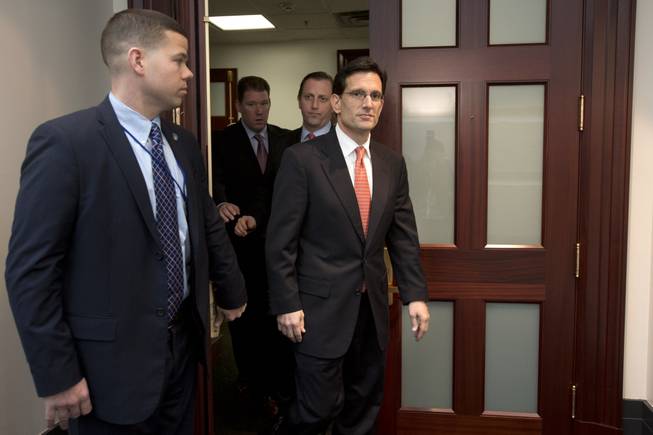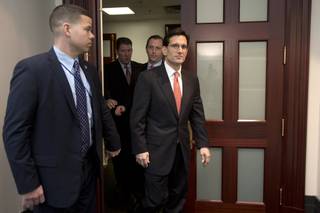
Jacquelyn Martin / AP
House Majority Leader Eric Cantor of Va., right, leaves a Republican caucus meeting on Capitol Hill in Washington, Tuesday, Jan. 1, 2013. Cantor, the No. 2 Republican in the House leadership says he opposes a Senate-passed measure to avert the so-called fiscal cliff.
Tuesday, Jan. 1, 2013 | 1:05 p.m.
Related stories
- Why lawmakers’ failure to beat fiscal cliff deadline might benefit them
- Grand bargains give way to legislative quick fixes
- White House, Senate Republicans reach ‘fiscal cliff’ deal
- Biden and Reid take good cop-bad cop approach to negotiating with Republicans
- Payroll tax hike to take $1,000 bite out of average worker’s annual pay
- Country to head over fiscal cliff as lawmakers continue negotiating
- More Sun political news
The House of Representatives is poised to kick the "fiscal cliff" bill back to the Senate with changes, according to House GOP members emerging from a meeting on the deal Tuesday afternoon.
"I think they're going to try to see if there is an amendment that can get 218 votes," said Rep. Mark Amodei, emerging from a meeting with House Republicans in the basement of the Capitol. "I'm not afraid to vote for some [tax] revenues, but I want to see some meaningful stuff on spending and the debt ... I don't think I can go home and look my folks in the eye on that bill."
Amodei added that Republican leaders expressed the same sentiment during the meeting, most notably House Majority Whip Eric Cantor.
"He said: '89 senators couldn't find a single thing to cut?'" Amodei said. "I mean, that sums it up."
Cantor told reporters: "I do not support the bill" in its current form, upon exiting the meeting, as did most other Republicans who stopped to talk to reporters.
"I would be shocked" if the bill were not sent back to the Senate with changes, said Rep. Spencer Bachus, a Republican from Alabama.
"There's not a lot of support for this bill as it is," said Rep. John Campbell of California. "So the question is, what's next?"
On Tuesday morning, just after 2 a.m. EST, senators banded together to vote 89 to 8 to pass a deal that would extend Bush era tax cuts for income levels up to $400,000 or $450,000 for couples. Above that threshold, tax rates would be left at 39.6 percent, starting with 2013 tax returns. The deal would also extend energy tax deductions, the sales tax deduction, mortgage debt relief deductions and unemployment insurance for a year.
Taxes are one part of the so-called fiscal cliff, a combination of tax rate hikes and across-the-board federal spending cuts that were scheduled to go to in effect Tuesday morning. Together, economists predict, they will deliver a $600 billion gut punch to the national economy, enough to potentially spur a second, mini-recession.
Many senators gritted their teeth through the vote, but ultimately lauded the bipartisan cooperation that led to the deal and its passage.
Senate Republican Leader Mitch McConnell and Vice President Joe Biden struck the deal over Sunday and Monday, after months of wrangling between congressional leaders and the White House, in various combinations, to steer the country away from the fiscal cliff before the new year.
Fiscal cliff negotiations largely centered around President Barack Obama and House Speaker John Boehner, but unraveled a week before Christmas, when Boehner rejected an offer from the president to pair an extension of tax rates up to $400,000 with authority to raise the debt ceiling in 2013 and a deferral of the scheduled sequestration cuts.
While House Republicans want to make cuts to government spending, they don’t want the cuts that are part of the sequester, which is 50 percent weighted on defense and security spending. The cuts are delayed for two months under the fiscal cliff deal, which also puts off the issue of raising the government’s borrowing authority. Amodei said House GOP members want to see sequestration cuts delayed for a year instead, and considered separately from the debt ceiling.
Now, Congress has officially missed its self-imposed Jan. 1 deadline, technically pitching the country over the edge of the cliff.
Still, there are several weeks left before the full effects of the fiscal cliff will be felt. The Internal Revenue Service will not require payroll offices to have tax deductions reflect higher income tax rates, while the federal government cuts wont do their worst damage until the present federal budget expires in March.
But lawmakers had hoped to wrap things up, if not before the fiscal cliff deadline, then at least before the current Congress disbands on Thursday. Constitutionally, at noon Jan. 3, the 112th Congress ends and the 113th begins.
Now, it's not clear that will get done.
"We've got what, 45 hours?" Amodei said. "The pressure right now is, are you going to let taxes go up for everybody? I mean, they have gone up. But are you going to let that continue?"
Amodei acknowledged the potential blowback from letting the congressional session run out before answering that question. But Amodei said he and other Republicans were frustrated that since the debt ceiling debate of 2011 Congress seemed to be addressing, readdressing and repackaging the same issues of tax revenues, spending cuts and borrowing authority in increasingly unsatisfying ways.
"Some of the discussion was, if you're going to stand for any of that stuff, you need to start fighting today's battles today," Amodei said.
It is important to note that the problems with the fiscal cliff deal haven't all been on the Republican side. Several Democratic senators were frustrated that the deal extended lower tax rates for income levels above the $400,000 threshold. According to various reports, Democrats in the House felt equally pressured by Biden, who showed up to their New Year's Day meeting, to swallow a deal many were uncomfortable with.
Senators had hoped, however, that the ultimate overwhelming bipartisan support for a deal that was "better than going off the cliff," as Democratic Sen. Charles Schumer put it, would help usher the bill through the House.
"We're waiting here on the House doing something, finally, on the cliff, we hope," Reid said Tuesday at 2 p.m., when the Senate resumed session.
But heading into the House GOP meeting, Nevada Rep. Joe Heck — who said he has not yet decided how he will vote — warned people not to be so sure.
"I would think [it would be easier]," Heck said, "but there have been other bills that have come out of the Senate with that type of vote that haven't done well here."


Join the Discussion:
Check this out for a full explanation of our conversion to the LiveFyre commenting system and instructions on how to sign up for an account.
Full comments policy